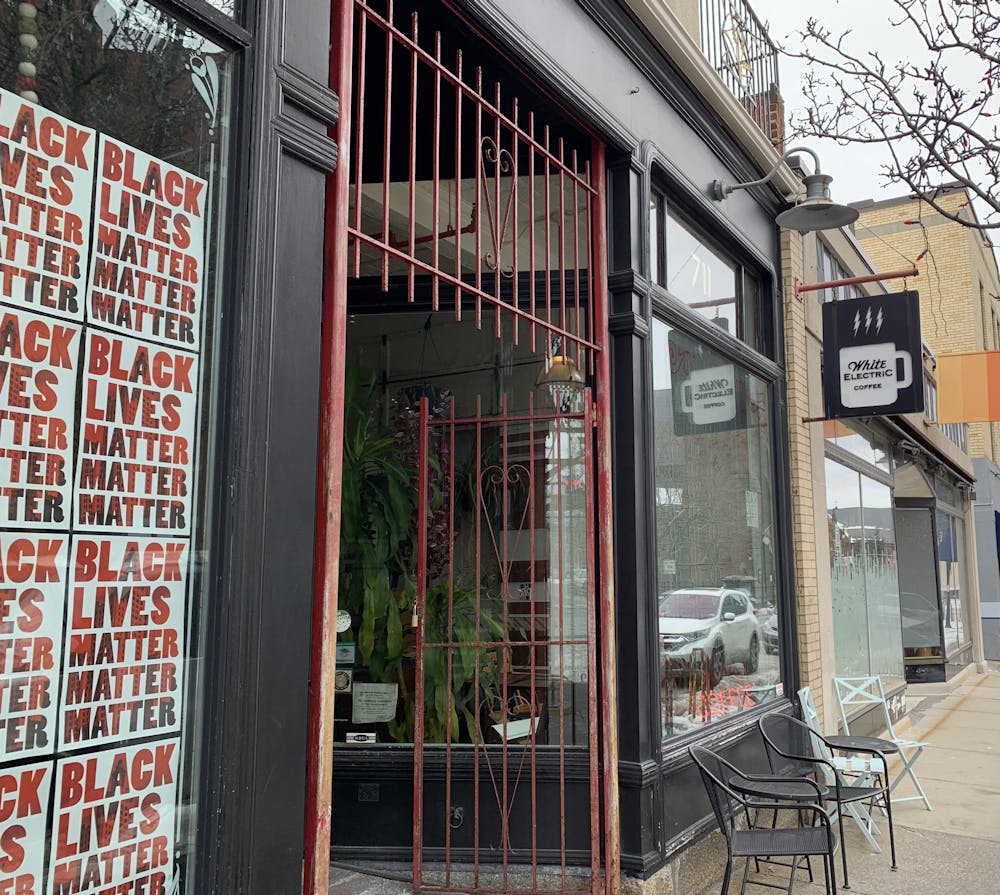Nearly two years after the onset of the COVID-19 pandemic with public health conditions still changing, businesses on Westminster Street in downtown Providence have persevered, in part because of rallying support for local shops, owners say.
Even when Rhode Island had the highest COVID-19 infection rate in the country, stores found ways to adapt, remain open and stay afloat under the most trying of circumstances, owners said. For those businesses that survived the past two years, Westminster’s hustle and bustle is more than just a welcome sight — it is their lifeline.
The Herald spoke with three different downtown businesses about their experiences during the pandemic.
White Electric Coffee
During the pandemic, White Electric Coffee transformed to a worker-owned cooperative.
Chloe Chassaing, worker-owner at White Electric Coffee and founding member of the Collaborative Union of Providence Service-Workers, as well as overseer of all cafe operations, said the pandemic was the major catalyst for the shop’s changes.
After requests they made for changes to the workplace were not met, Chassaing and the rest of the staff formed a union. CUPS, the independent union, was initially recognized by White Electric’s owner.
Soon after, the owner of the shop told the workers he was selling White Electric. Chassaing said that she and her coworkers decided to undertake the large task of “finding loans, doing community fundraising (and) negotiating with the prior owner” to convert White Electric Coffee into a worker-owned co-op. They officially reopened under the new format on May 1, 2021.
Despite this victory, Chassaing said, the pandemic still threatened the cafe’s prospects.
“Like other food service establishments, we've definitely experienced ups and downs during COVID due to the combination of stay-at-home orders, uncertainty, remote learning and work and our own caution and decision to delay reopening our indoor dining,” Chassaing said.
But takeout orders had always formed a large portion of White Electric’s business, which Chassaing said helped keep the shop afloat during the pandemic.
She said she also sees unique benefits to being a co-op situated in the pandemic.
“Because all of our decisions are made collectively and our finances are transparent to everyone who works with us, we can discuss and adapt as needed and in a way where we all feel comfortable,” Chassaing said.
Health and safety for the staff has presented challenges, she added. Some staff have contracted COVID-19, but with quarantining and testing, White Electric has managed to mitigate the spread of the virus within the cafe itself, according to Chassaing.
Transitioning from the traditional ownership model to being a worker-owned shop during a pandemic was difficult but rewarding, Chassaing said.
“I'm hoping that we can be a success story, not just for our own sake, but to contribute to the community and serve as an example to others that alternative workplace structures are possible,” Chassaing said. “There's no reason why food service has to be exploitative and top-down. There's no reason why most jobs can't be more rewarding and sustainable and truly cooperative.”
Sin
Tucked away on Westminster Street, Sin bakery is partly removed from downtown.
Its devil-tailed logo gives a hint about what kinds of baked goods you can find in the shop, including decadent “Sinnamon” rolls, cupcakes of all flavors and the store’s specialty: its whole cakes.
The bakery was opened by owner Jennifer Luxmoore in 2007, and was initially run out of a warehouse, she said. From its humble beginnings, Sin has grown to a storefront bakery complete with a dessert bar and custom cake shop. But its growing success changed with COVID-19, Luxmoore said.
“I had to lay almost everybody off at the beginning (of the pandemic) and then slowly bring them back,” Luxmoore said.
When COVID-19 cases began rising in Rhode Island, Sin was forced to drastically alter its open hours, in addition to reducing its staff. The bar and custom cake shop have remained closed to the public, but Luxmoore hopes to reopen them in April of this year.
“I kept a skeleton staff — just me and one other person,” Luxmoore said. “It was crazy, but we kept getting orders for ‘Can I send my son some cupcakes, because I’m not going to be able to see him?’ ‘Can I send my daughter a six-inch cake, because her wedding was supposed to be this week?’ ”
Luxmoore credits her business’s survival to the influx of orders since COVID-19 arrived, particularly in the early stages of the pandemic. Sin’s also changed its business model — in addition to transitioning to online ordering, Luxmoore hired a delivery person to facilitate local dessert drop-off and even began shipping select desserts nationwide.
Luxmoore said living through COVID-19 as a small-business owner has meant experiencing never-ending stress. She said she has faced obstacles along the way — just recently, a string of employees fell ill with the Omicron variant. Particularly in the early pandemic, she worried constantly, not only for the survival of the bakery, but also for the wellbeing of her employees.
Luxmoore said she was forced to make difficult decisions “knowing that you’re laying off all these people, and that they are relying on you for their survival — their living.”
With easing pandemic restrictions in Rhode Island, Luxmoore said she is expecting store patronage to return to some semblance of what it looked like in 2019.
Luxmoore expects that it will take time for the perception of Sin as a place for social gathering to return. Sin shifted how customers interacted with the bakery during the pandemic, from a place for sitting with a cup of coffee to a grab-and-go stop to get in and out of as quickly as possible. She noted that she’s recently begun to see the tides turning, with more customers sitting in the cafe for longer stays.
While local support of the business was instrumental in its survival, Luxmoore emphasized that the store would have had to close if not for the loans and grants made available to small businesses. Small orders kept the store running in the early days of the pandemic, but Sin “survived on the (Payback Protection Program) loan,” Luxmoore said.
“Any free money that came up, I applied for,” Luxmoore said. “I didn’t get everything. But if it was there, I applied for it. We would not be in business today if we didn’t get financial help.”
Civil
Unlike many downtown stores, Civil, a skateboard shop, saw business boom during the pandemic.
With people encouraged to isolate and gyms closed worldwide, demand for outdoor exercise that required little to no specialized equipment increased, according to keyholder Kenny Borge.
Borge said customers come to Civil for anything and everything skateboard related. Julien Mauss, a staff member at Civil, said that foot traffic has been consistently high since an initial business surge in April 2020.
“People started skating more because you can do it on your own,” Mauss said.
“The skate community has grown a lot, and more people have been gravitating towards skateboarding,” Borge said. At the beginning of the pandemic, “I noticed a surge in online sales and in-person sales as well.” He said that the surge has continued to present.
Borge said increased desire to be outdoors and among other people explains the rise in popularity of skating that Civil has witnessed.
Despite the rise in business during the pandemic, Civil didn’t remain unscathed by COVID-19, Borge said. Staff shortages became problematic at times, according to Borge, and temporary closures due to staff COVID-19 exposure, while infrequent, did hinder business.
“We had to close last year because there’s not really that many staff who work here,” Borge said. He added that Civil was taking extra precautions to keep staff and customers safe, and the shop had to close at times when staff had gotten exposed or got sick.
Nonetheless, Civil found a way to work around the staff shortages. Borge said since the store was able to hire more staff, it was able to remain open even while workers took the necessary time off to self-isolate.

Yael is a senior staff writer covering city and state politics. She is junior, and hails from the Bay Area.





